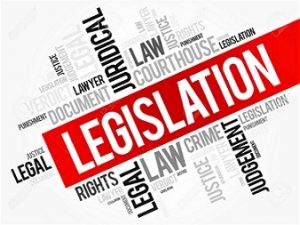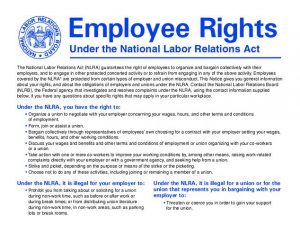Resources And Compliance
This is an area of our website where you can access information and view resources that will help you gain the knowledge to understand and succeed when negotiating with HR and/or Management Officials. There is also information that will help those with representational roles provide proper representation of our federal bargaining unit employees (BUEs) in a rapidly changing Labor/Management work environment.

Understanding Rules And Rights
- Probationary-Period/New-Employees
- Administrative Leave
- Union Member Rights and Officer Responsibilities Under the LMRDA
- The Hatch Act
- The Federal Service LMR Statute
- Employee Rights/NLRA

-
The Douglas Factors
-
Weingarten Rights
All BUEs must adhere to the grievance procedures within the Collective Bargaining Agreement. For Federal Workers who are not under a collective bargaining Agreement the Administrative Procedure below applies:
The Administrative Grievance Procedure

Some legal Web-Resources
Ask The Educator
- Question… My Position Description reflects “7777” in the appropriate block of the cover page (OF-8). I want to be represented by a Union but no other workers in my Job Series at my workplace has expressed any interest in supporting this effort. For whatever reason now it appears their interest has changed and they now want Union representation…..What can we do?
- Answer… The FLRA Statutes (Representation)

A “Teachable Moment”
What is a GRIEVANCE? When asked the definition of a grievance, most stewards respond by saying, “a grievance is a violation of the contract”. Some more experienced stewards may add that a violation of past practice is also a grievance. Most members, however, see the definition of a grievance as being much broader. If they feel they have been treated improperly by the company, that’s a grievance and the union ought to be able to rectify the situation. A thorough understanding of what constitutes a grievance in your workplace is essential for you to carry out your duties as a grievance handler. Being able to distinguish a legitimate grievance from a gripe and being able to articulate that distinction to the members is a vital skill.
Contractual Definition of a Grievance; Most collective bargaining agreements define, in a general sense, what the parties have agreed to consider to be a grievance. The primary function of the definition is to outline the parameters of what types of disputes may be grieved. Such parameters range from recognizing any dispute between the parties as being grievable (very broad definition) to limiting a grievance to a dispute over the meaning or application of a particular clause in the contract (narrow definition). It should be noted that although the contractual definition of a grievance may be narrow, it does not necessarily limit what the union grieves. Listed below are five definitions (restricted and liberal) of a grievance taken from collective bargaining agreements of various international unions.
- A grievance is said to exist should a difference arise between the Company and the Union as to the meaning and application, or the observance or performance by either party of any of the provisions of this Agreement (including differences as to whether the wage or working conditions of any individual employee or group of employees in the unit are out of line with the wage rate or conditions that should apply to him or them pursuant to this Agreement).
- A difference arising with respect to the meaning and application of any provisions of this agreement.
- For the purpose of this agreement, the term “Grievance” means any dispute between the company and the union, or between company and the employee, concerning the effect, interpretation, application, claim or breach or violation of this Agreement.
- The term grievance shall mean any dispute or controversy between the company and one or more of its employees or between the company and the union.
- A grievance is a complaint, dispute or controversy in which it is claimed that either party has failed to comply with an obligation assumed by it under the terms of this agreement and which involves either a dispute as to the fact involved or a question concerning the meaning, interpretation or application of this agreement.
Six (6) grounds for a grievance
Generally a grievance exits if there is a violation of one or more of the following:
-
The Contract (Agreement, Memorandum of Understanding, Letters of Agreement, or whatever documents function as an agreement in a particular plant, office or agency.) These are often the easiest grievances to win in the early steps of the grievance procedure, especially where the violation is clear-cut and management is not overly belligerent.
-
The Law (Municipal, state and/or federal laws may have been violated). One way to look at the law is that it provides certain minimum protections which can be enhanced through the collective bargaining process. For instance, if the Fair Labor Standards Act requires paying $5.15 per hour, an employer cannot pay less than that amount. However, a union can certainly attempt to bargain wages that exceed this minimum. Other laws that might be violated are the National Labor Relations Act (e.g. management discriminating against union activist), the Civil Rights Act, the equal pay act, laws governing unemployment and workers’ compensation and the Occupational Safety and Health Act. Knowing that management is in violation of the law can be an important lever in the grievance procedure.
-
Past Practice. The violation of long standing practices, accepted by the union and management, is legitimate grounds for a grievance. Deciding whether a past practice does in fact exist can be difficult.
-
Company Rules or Agency Regulations. Management normally has the right to unilaterally promulgate reasonable rules that must be observed by workers as a condition of employment. The union, however, has the right to grieve such rules based upon their reasonableness. A “no-fault” attendance policy is an example of a set of rules that could be challenged as being unreasonable. Just as management has the right to initiate rules, it is expected to enforce them in an evenhanded manner, and to abide by them when dealing with those covered by the rules. In public employment, especially the federal sector, the many sources and volumes of agency and department regulations make it particularly likely that management may be violating its own rules.
-
Management’s Responsibilities. While the management rights clause reserves many areas to management’s discretion, it may be inferred that, conversely, management has certain responsibilities in these same areas. For example, by reserving the right to determine methods and processes of production, management can be held responsible for the proper functioning of the equipment and machinery, particularly if workers are on piece rate or if their safety or health is affected by the malfunctioning equipment.
-
Just Cause/Discipline. The overwhelming majority of contracts stipulate that “just cause” must exist for the issuance of discipline or discharge. Rarely is just cause defined in the contract, but standards have emerged that most arbitrators will accept and the union should use when pursuing this type of grievance.
